She Did
Journalists Jodi Kantor and Megan Twohey exposed Harvey Weinstein. Zoe Kazan and Carey Mulligan play them in the new film 'She Said.' Together, they tell a vital story.
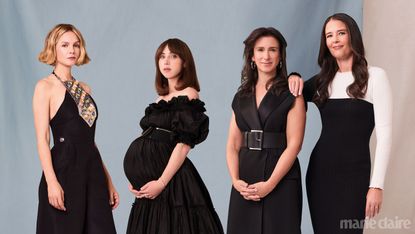

“I can’t change what happened to you in the past, but if we work together, we may be able to help other people.” This is what New York Times investigative journalists Jodi Kantor and Megan Twohey told the women they spoke to as they began reporting a new story in 2017. Women who felt scared, voiceless, powerless. Their sources couldn’t possibly know the pattern they might be a part of or envision the bigger picture that would appear as their personal puzzle piece was placed. But interview by interview, fact by fact, the writers were able to craft “Harvey Weinstein Paid Off Sexual Harassment Accusers for Decades,” an article that not only sent shock waves through Hollywood, but also ignited in a new way the #MeToo movement—originally established by Tarana Burke—opening the floodgates for women around the world to come forward with their stories of harassment and abuse.
Now, five years later, audiences will witness this “testament to female heroism,” as the actress Carey Mulligan describes it. She plays Twohey alongside Zoe Kazan as Kantor in the feature film She Said (in theaters November 18), based on that article and the writers’ subsequent book. But the movie isn’t simply a rehashing of the Weinstein story; it’s a portrait of the bravery, sacrifice, partnership, and power—of both the individual and the collective—that can, in fact, foment change. Here, the four women discuss their work, its impact, and the state of the movement today.
This movie is premiering five years after Jodi and Megan’s article was published. How has the landscape for women in the workplace changed?
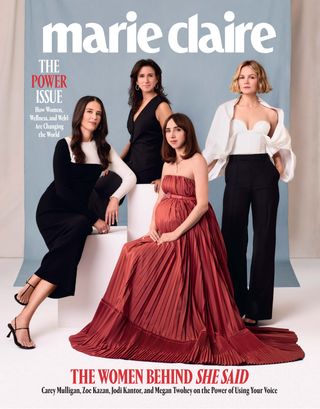
Zoe Kazan: I think that things have to happen at the right time for them to have cultural impact, and that is a mysterious thing. The momentum of this story, it was something snowballing, where every person who came forward, every article that came out, added to a cultural conversation that we were, in that moment, ready to have. I think it’s an incredible testament to the work that Jodi and Megan did, that this article opened that door. I also think that the movement having already been started and the infrastructure of activism already being mobilized helped organize that energy and move it forward.
Within my own industry, I’ve seen such concrete changes. I remember when the article came out thinking, I wonder if this is going to have any impact? I wonder if anything is going to change? And the answer came so swiftly; the conversation changed so rapidly. Things like having an intimacy coordinator [on set], things like men being aware of boundaries in a different way on set.
Carey Mulligan: I was doing a monologue at the Royal Court Theatre [in London]. It was the January after the article ran. And we sat down—me, the writer, the director, the producer, the crew—and we all were asked to read a code of conduct. And that had specific language about the way that we were expected to behave within the workplace. That was part of their new system to deal with #MeToo and trying to establish a workplace that felt completely safe. That felt, automatically, like a real step in the right direction.
My suspicion is that things haven’t changed quite as much as we would all hope across all industries.
Stay In The Know
Get exclusive access to fashion and beauty trends, hot-off-the-press celebrity news, and more.
ZK: [It wasn’t] always a smooth transition, I remember being in a press line and an older male actor [saying], “My hands are up. I’m not putting my hands anywhere near these ladies,” and me thinking, Oh, you’re missing the point entirely.
But I can’t help but be grateful for those changes. At the same time, I think we are all looking at a solid wall of human history in the way that women are thought of, and non-binary people are thought of, and trans people are thought of. So I don’t think that this film or this movement is trying to say, “We’ve solved all the problems and we can move on.”
Jodi Kantor: We see in our reporting all the time that everything’s changed and nothing’s changed. There are areas where there has been a profound cultural shift. And then, on the other hand, you ask yourself: For a woman working a minimum-wage job—given that federal sexual-harassment laws are still pretty weak in this country—is she really any better protected than she was five years ago? But part of why we’re so honored for this film to be shared is that it takes us back to a moment of real uncertainty.
Megan and I just can’t stress enough that we did not know how the story was going to land. [Our book and this film invite] people to stand there with us during the first conversations with actresses, and during the moment when Harvey Weinstein burst into the newsroom almost uninvited. When we were living that moment, the big question in our minds was, Are we going to be able to publish this story? But now the question on my mind is more: Where does progress come from, exactly?
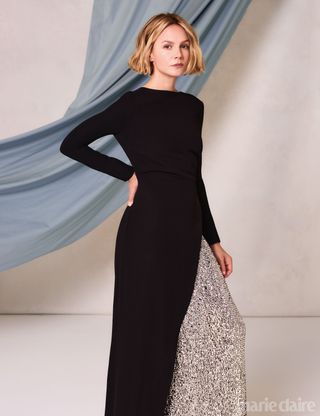
Givenchy dress and shoes. | Hair: Kylee Heath at A-Frame Agency using Sisley Paris | Makeup: Kara Yoshimoto Bua at A-Frame Agency using Chanel | Manicure: Emi Kudo at A-Frame Agency using Chanel Le Vernis
Megan Twohey: It was this unprecedented moment of accountability. To see so many powerful men who would abuse that power ejected from a variety of professions was remarkable. Five years later, we’re trying to catch up and assess what the bigger impact has been beyond individuals. What are the systemic changes? In the Weinstein investigation, there were a lot of women who had been legally silenced through secret settlements, which are still used every day. But also, we’ve seen real concrete changes. More than [15] states have passed laws to better protect the workplace from sexual harassment, including [limiting] NDAs.
In the film and in the book, there were many survivors who blamed themselves; they thought they made an error of judgment and they had a lot of shame. Have stories and films like this shifted that mindset? Can they?
JK: We’re fascinated to see how people react to the film. But your question is so spot-on. Some of these women had never really...let me back up one second. Many of these women had not widely shared what had happened to them, and they didn’t have the context of knowing that there was a much greater pattern of stories about Weinstein. So there were some conversations where [women] would start by saying, “Jodi, I could never be in your story, and I could never go on the record because this was really all my fault.” They didn’t know that this had happened to anyone else.
Megan and I started to call it “the pattern” a few weeks into working together because part of what was remarkable…is that these women of different ages and different backgrounds, in some cases from different countries, were relating eerily similar details. “It took place in the Beverly Hills Peninsula Hotel. I was supposed to meet him downstairs, but then he told me I had to come upstairs to look at something,” et cetera, et cetera.
One thing Zoe represents so beautifully in the film is the dialogue with some of the victims. And part of that conversation was: “How do I gently contextualize your own story for you to make it clear for you that your story is also about something much bigger?” And there’s pain in that because knowing it was even worse is really hard. But there’s also some relief because, going back to your question, there is the relief of understanding that these women were not, in fact, alone.
What was it like coming together, the four of you, for this project?
MT: Well, obviously for me and Jodi, it began with actually executing the investigation and then deciding to write a book about it. We felt like there was a lot of drama that had played out in the pages of The New York Times. But we also knew that what had happened behind the scenes was extremely dramatic. We had encountered so many incredible sources and women along the way, and we had encountered so many underhanded tactics from this powerful bully.
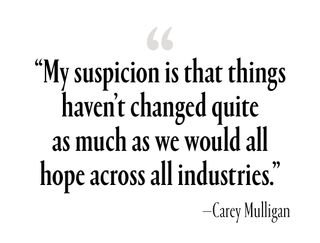
Then, to turn that over to the filmmakers, we had a variety of conversations with people in the film industry who were interested in telling the story. For us, this really began in finding what we considered to be the best people to take our material. We did consulting along the way, first with the producers and then the screenwriter, and then with Zoe and Carey, who took such great care in spending time with us and observing us and questioning us about the material.
ZK: Reading Jodi and Megan’s book—which was the first thing I did—was incredibly instrumental. So I didn’t have as many questions about the journalism. I had some practical questions of: “Do you use a recording device? Do you take notes? What do you wear? How do you sit?” We were looking at the script together, and so [I had] some questions about: “How does this feel to you compared to your actual experience?” But also I knew we were making a movie, and that’s different than real life. It’s different than making a documentary. It felt more important to me to spend time with Jodi and get a sense of her as a person. I’m, by nature, very nosy.
You would make a great journalist.
ZK: I love to have the opportunity to ask questions: “What does dinner time in your house look like and how does that happen? And what’s your childcare situation?” All the things that aren’t going to show up on screen, but that I [use to] fill out an imaginary life.
The four of us had a meal together, which was really exciting and felt sort of bubbly in a way. There’s so much that’s delicate and heavy and weighty about this material. So it’s nice to have a little joy, too. Carey and I have been friends for a long time; it feels like we already have a partnership. And then to meet this other partnership was really joyful.
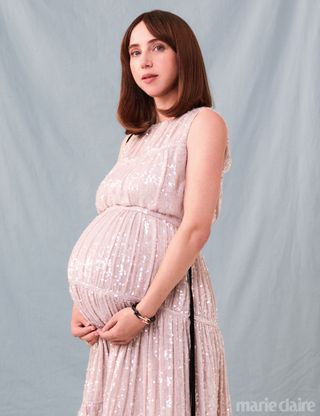
Erdem dress; Tiffany & Co. bracelet. | Hair: Christopher Naselli at The Wall Group using Innersense Organic Beauty | Makeup: Kirin Bhatty at A-Frame Agency using Sisley Paris | Manicure: Shirley Cheng at See Management using Zoya
CM: I was at home in the U.K., so I think Jodi and Zoe got to hang out a bit more initially. [Megan and I] started with Zoom calls. Then, when I got to New York, we just hung out and drank coffee and talked for hours and hours and hours, and I semi-interviewed her in a way.
Did you have any personal experience that you were pulling from in preparing for the role?
CM: I was never, luckily, exposed to that side of casting. All of my casting experiences have been very conventional: going to an office and being taped with multiple people in the room. I was very lucky that I never had to go through anything like [what Jodi and Megan reported on].
ZK: It felt really good to be addressing this kind of content from a position of making a change, playing someone making a change, and not helpless. I think most women have had some experience of inappropriate contact, sexual harassment, inappropriate language. The rape statistics alone are so unbelievably high. I could be wrong, but it seems impossible to me that it isn’t...it must be most, if not everyone, who’s had some experience that has made her feel uncomfortable, shamed.
So yeah, it’s impossible, I think, that I would come to this with a blank slate or no experience of my own, but I wasn’t really drawing on that. I was drawing on my feelings about justice and about the world that I want to create for my daughter. And the feeling of power that comes from using your intelligence to make a difference in the world.
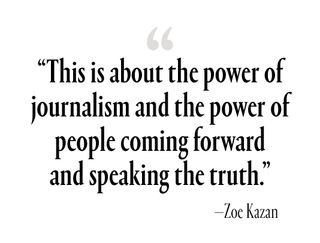
You mentioned your daughter. In the film, the theme of mothers and daughters is very strong. There’s the element of balancing work and motherhood. And then there’s an intense scene where, Zoe, you as Jodi have a conversation about the word “rape” with the character of Jodi’s daughter. Megan, your struggles with postpartum are depicted. All four of you have daughters. What about those relationships did you bring to this work?
MT: This film depicts personal things about me and Jodi that we’ve never discussed publicly before, including the postpartum depression I experienced after my daughter was born. I just want to say how much I appreciated Carey being so diligent and careful in the time that we spent together. We had play dates with our children and we had meals and she grilled me, not just about the journalism, but what my experience had been in those first extremely difficult months of parenting. And so it makes me feel a little vulnerable to see that depicted.
But I also was so appreciative of the care that she took, not just in getting a sense of me and capturing it, but taking that delicate material and representing it very accurately. There’s a scene where she’s calling her husband, bawling, and she can’t really explain why, but she needs him to come home from the office because she feels so fragile being home alone with the baby. That plunged me right back into a real-life moment.
[The film] also shows her returning to the office. There’s something about the way she yanks open the door to The New York Times on the first day back from maternity leave that captured what it felt like for me to go back to work and to return to my sense of self after this really rocky period of early motherhood. To start this investigation [on] my first day back helped return my sense of self. Because this wasn’t just a story that could hopefully expose a predator, but [it could] make the world—and, ideally, the workplace—safer for my daughter.
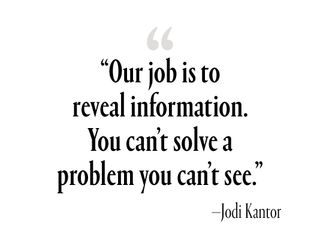
CM: I thought it was really brave of Megan to allow the film to portray that side of the story. That was something that we shared, because I had a similar experience when I had my daughter. I had to go and release a film and I was struggling enormously. I was in a really terrible place, but I knew, similar to how Megan did…she knew that she could put her work hat on, and that’s ultimately something that pulled her out. And it was the same for me. That was something that Megan and I talked about a lot. That was one of the things that really clicked for me when I read the script and one of the reasons I wanted to play the part.
JK: To echo some of what Megan said, I don’t think we’ve ever really talked about how much of our relationship is built around motherhood. We didn’t know each other well before this investigation. And each of us thought, Eh, I’m not really going to be friends with her. But the way we first connected was that I was in a difficult position in the early months of the Weinstein investigation. I was alone, and movie stars were confiding stories to me, but they said they had to stay secret forever. On the one hand, as a reporter, you want to be gaining information. But to hear these troubling stories and feel that I didn’t have a path to do anything with them was anxiety provoking. I called Megan for advice, but when I called her, it was clear that something was wrong.
I had [experienced] postpartum depression too, and we helped each other. I gave Megan the name of the doctor who treated me, and Megan gave me this line that became the lodestar of our investigation, which is saying to women who have experienced something terrible, “I can’t change what happened to you in the past, but if we work together, we may be able to help other people.” I appreciate the layers that this movie brings to that. Because it’s not a cliché: We’re doing it for our daughters, but it’s so much more than that. And we’re so honored by the depiction of working parenthood. Zoe, I have never seen anyone juggle a stroller and a phone call as realistically—
ZK: I wonder why.
JK: Exactly. In a way that’s so true to life. You showed the somewhat harried quality of it, but I think you brought real dignity and beauty to the effort as well.
MT: I think working women are going to see this film and recognize both how hard it can be to balance work and motherhood, but also how rewarding.
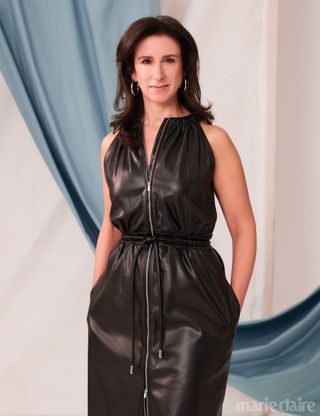
Jodi’s own dress; Jennifer Fisher earrings. | Hair and makeup: Liz Olivier at Exclusive Artists using Valentino Beauty | Manicure: Shirley Cheng at See Management using Zoya
ZK: We started filming the exact same day that [my partner] Paul [Dano] started filming in Los Angeles. Our daughter had two parents who were working 17-hour days on opposite sides of the country. And the only way that we could make that work was that I had to have a really extraordinary nanny, who I am so indebted to. And my parents relocated for almost three months.
My mother was a working mother who did not have someone doing that for her. And the reason that she feels so missionized, I think, to do this for us is to give me a different experience than she had. And so that was on my mind every day when I went to work.
Those scenes of motherhood in the movie were actually some of the most important scenes to me. Everyone talks about work-life balance, but it’s also really hard to balance your priorities. I wanted to be the person who took my daughter to her first day of preschool, and I couldn’t do that because I felt like this job, this work was as important as that. And vice versa. I was just really relieved to read a script where that was represented and where I could put that part of myself in there. And I felt really bolstered by having [Megan and Jodi] and [their] experiences and Carey and her experiences. It made me feel not alone.
This is a movie set in New York about journalists, but it’s also about Hollywood and, particularly, the machine and the system and the outsized influence of the casting couch. What was it like getting cast in this film?
ZK: Roles like this don’t usually come my way. I was not pursuing it. Carey and I have a close mutual friend who said, “Oh, Carey is signing on to do this project about this journalist.” And I was like, “Oh, that’s so exciting for her.” I never thought, There are two journalists. And then a few weeks later my agents called and were like, “Prepare for this meeting.”
CM: I remember I gave [the script] to my husband to read, and he finished it, and he said, “Oh my goodness, Zoe would be the best Jodi.” And I was like, “I know, she would be amazing.”
We’re always trying to find stuff to do together. But I wasn’t the producer; it wasn’t my role to put anyone forward. I was just waiting to see who they would come up with. I remember hearing, “Oh, they really want to talk to Zoe.” [But] I didn’t want her to feel pressure if she didn’t like the script. I didn’t want her to feel like, Oh, I have to do this because Carey’s doing it and she really wants me to do it. So I was trying to be gently encouraging but not [so much] that she would feel like she was letting me down if she didn’t want to.
ZK: I felt really excited to dive in, very daunted. I think the most meaningful thing to me is in the first conversation in the film that Jodi and Megan, the characters, have about this story. My character says, “If this is happening to these women who have power and the platform and money, who else is it happening to?” The Hollywood aspect of it is not the thing that drew me to the story. This is about the power of journalism and the power of people coming forward and speaking the truth; the power of there being institutional support and infrastructure to bring those stories into the world with integrity and in an airtight way, and about incremental change being made as a result.
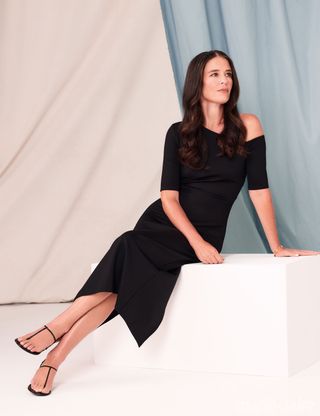
Rosetta Getty dress; Khaite shoes; Tiffany & Co. bracelet. | Hair and makeup: Brenna Drury at Exclusive Artists using Charlotte Tilbury and Oribe | Manicure: Yukie Miyakawa at See Management using Chanel Le Vernis
CM: [For me,] it was Megan and Jodi that were the initial draw. And then, of course, when you start to immerse yourself in this historical moment—which is really what it is—that became such an enormous part of the process.
But the initial draw was these two women and how do they function and how did they do this job? It’s always just so fun as an actor to go into someone else’s life, where you have no idea how their brain works. The idea of being someone who can show up on a doorstep and knock on the door and say, “Tell me about this thing that happened,” and, “You can trust me.” And someone who doggedly pursues the truth, and the rigor with which they have to do everything they do—dot all the Is and cross all the Ts. It was the two of them. It was Megan. It was just these extraordinary individuals and their group effort.
One scene that is particularly moving is when Ashley Judd calls to say that she’s going to go on the record. What was it like for you, Zoe, acting that scene, especially because Ashley is portraying herself?
ZK: I did not have Ashley there on the phone. I wouldn’t have wanted her to do that [scene] more than she was going to when the camera was on her. We’re so used to using our imagination. I did know that she was going to be participating, and that meant a lot to me. I feel acutely all the time how the world was changed for me by the women who went before me. And it’s on my mind all the time how I can move things a little bit forward for the next generation. That we are in a great lineage.
It’s very rare that I’ve gotten to be with another woman in partnership on screen. Having a partner in Carey, having a very long relationship...we’ve been friends for 14 years. And so I felt, in a moment like that on set, I felt like I could be brave looking into Carey’s eyes and knowing that she had my back. And as important as knowing that Ashley would be on the phone was knowing that I could reach out and take Carey’s hand.
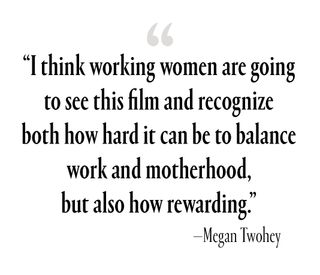
Jodi and Megan, prior to this piece you had reported other highly important stories—about Amazon and Starbucks and Trump. But then, following this article, came a book and now a film. So, how have the last five years been for you? Has there been a shift in your world?
MT: I mean, yeah, absolutely. Listen, Jodi and I could have never predicted that our story would’ve helped ignite this global movement, or that it would’ve been made into a movie. Up until we pressed publish, we were just completely obsessed with achieving an airtight story, as Zoe pointed out. We could barely see straight at that point. And since then, we’ve been completely...it’s just been wonderful to see this story reach, first, the readers of our book and now the people who are hopefully going to see this movie.
But the truth is that it has not changed our lives, our day-to-day lives. Jodi and I are still juggling motherhood and work and we are still extremely proud members of the investigations team at The New York Times. We have continued to do investigations since then. We are working on ones right now. It’s the ultimate privilege to be able to do this work. I still kind of can’t believe that I get to do it.
JK: I totally agree with everything Megan said. We’re still taking the subway to the office. We’re still starting from scratch on many stories. Journalism is very humbling because every day you’re reminded of what you don’t know. But it’s our job to make people more confident in telling the truth. And if this film helps build that confidence, we would be so proud. Not just for us, but for our peers, other journalists, as well.
We’ve discussed what has changed in the last five years; where do we go from here?
JK: For Megan and I, our job is to reveal information. You can’t solve a problem you can’t see. We’re not politicians, we’re not activists. We are very sorry to tell you that we don’t have perfect solutions. And even if we did, we wouldn’t be able to tell you what to do. Our job is to take information that’s not seen and share it with the public so that we can have the most meaningful possible discussion.
ZK: I think looking to the people who are already doing that activism and have their feet on the ground and are moving us forward. [That is,] at least, where I start because I am not that well equipped.
MT: The #MeToo movement has become...I think that this movie is coming out at a really interesting and important time because, five years later, in some ways, things have become more confusing and more complicated. I think as people are trying to grapple with their feelings and where they stand on some of these issues today, it will actually help to go back to this really critical period in time. It’s going to bring into sharp focus some of the issues that we were grappling [with] at the time and continue to grapple with today.
CM: There’s so much more to do and progress happens very slowly. We’re so bombarded at the moment with stories about violence against women all over the world.
I do think it’s so hard to speak with any kind of authority about the experience of women. We live in a position of such complete privilege. But I do hope that the film...I think it’s a source of inspiration for young girls and women to have all of these incredible survivors in the film. Their bravery. These two women operating at the highest possible level professionally. Having these monuments to these women on screen.
This interview has been edited and condensed for length and clarity.
Photographs by Lauren Dukoff, represented by Supervision | Styling by Tracy Taylor | Production by Samantha Rockman | Set Design by Chelsea Maruskin
Lead image: On Carey: Chanel top, pants, and belt; Michael Kors Collection shoes. On Zoe: Dior dress, belt, and shoes; Tiffany & Co. bracelet and ring. On Jodi: Lafayette 148 vest; Michael Kors Collection belt; Jennifer Fisher earrings; Jimmy Choo shoes. On Megan: Victor Glemaud dress; Khaite shoes; Megan’s own ring.
Cover image: On Carey: Carolina Herrera top, Gucci pants, Michael Kors Collection shoes. On Zoe: Max Mara dress and belt, Tiffany & Co. necklace and rings. On Megan: Victor Glemaud dress, Khaite shoes. On Jodi: Tibi vest, Theory pants, Jennifer Fisher earrings.

Danielle McNally is a National Magazine Award–winning journalist. She is the executive editor of Marie Claire, overseeing features across every topic of importance to the MC reader: beauty, fashion, politics, culture, career, women's health, and more. She has previously written for Cosmopolitan, DETAILS, SHAPE, and Food Network Magazine.
-
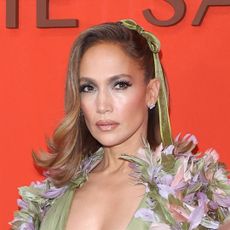 Jennifer Lopez Shares What She's Learned After Becoming "a Single Mom"
Jennifer Lopez Shares What She's Learned After Becoming "a Single Mom""Am I enough for them?"
By Amy Mackelden Published
-
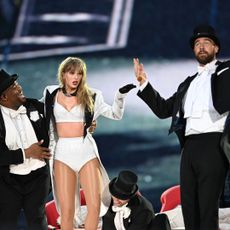 Is Travis Kelce Coming to the Eras Tour in Vancouver?
Is Travis Kelce Coming to the Eras Tour in Vancouver?We investigate.
By Kristin Contino Published
-
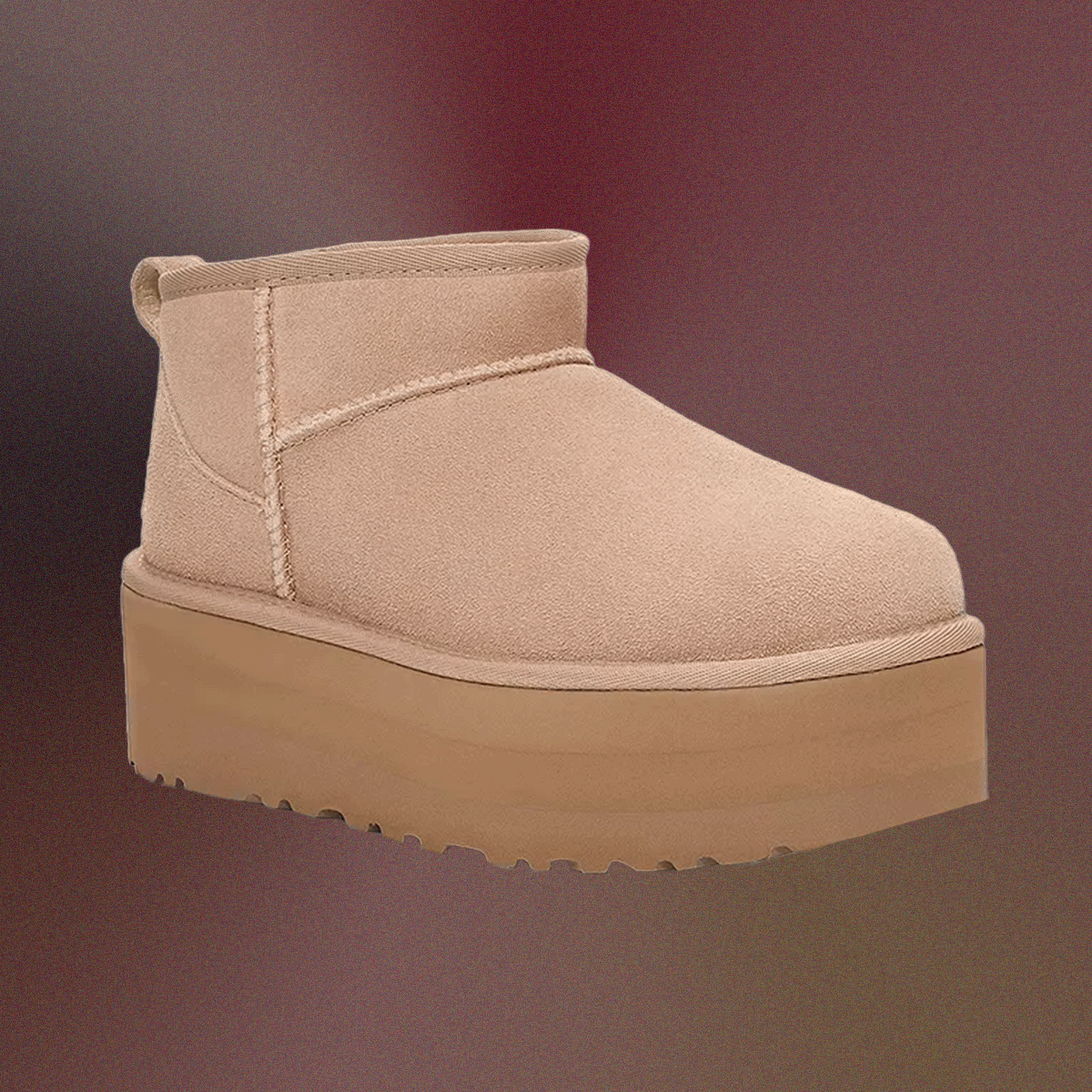 Winter's Most-Loved Shoes Have Made Their Annual Comeback
Winter's Most-Loved Shoes Have Made Their Annual ComebackEveryone needs a pair.
By Emma Walsh Published
-
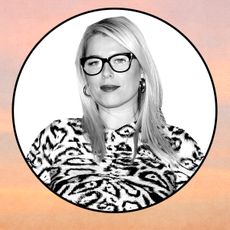 Amanda de Cadenet Wants Us to Start Listening to Men
Amanda de Cadenet Wants Us to Start Listening to MenWith her new podcast, the host is hoping to gain a deeper understanding of modern masculinity and its role in advancing women’s rights.
By Emily Tisch Sussman Last updated
-
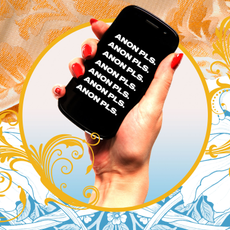 Gossiping With DeuxMoi, the Internet's Lady Whistledown
Gossiping With DeuxMoi, the Internet's Lady WhistledownThe woman behind social media's "Society Papers" dishes on being the keeper of Hollywood's secrets and names her Diamond of the Season.
By Neha Prakash Published
-
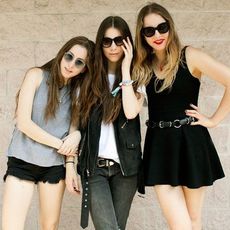 Need to Meet: HAIM
Need to Meet: HAIMMarie Claire catches up with festival sensation and band of sisters (literally) Haim at Governors Ball in New York City.
By Alyssa Vingan Published
-
Rascal Flatts is Unstoppable
No new name to the country scene, Rascal Flatts have released six studio albums where 10 of their singles have hit No. 1. Not to mention, their fan base spans worldwide. With a summer U.S. tour in the works and new album, Unstoppable, climbi
By Annie Reuter Published
-
A Book For Your Must-Read List
On writing, obsessing, and killing your mother.
By Kelly Marages Published
-
 A Two-Minute Date with Jason Lewis
A Two-Minute Date with Jason LewisBy Colleen Oakley Published